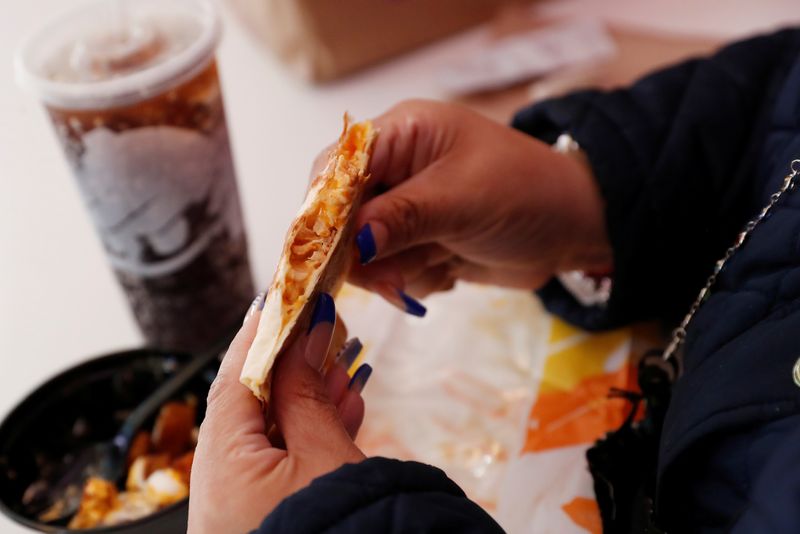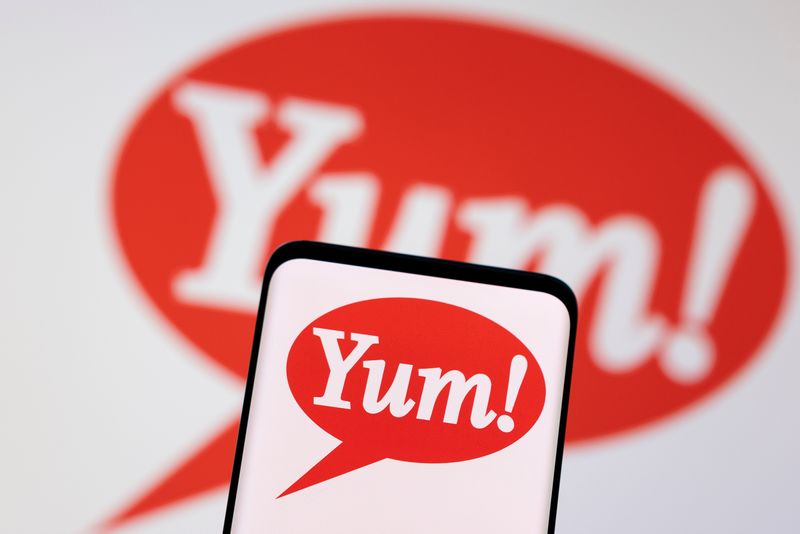By Deborah Mary Sophia and Hilary Russ
(Reuters) -Yum Brands Inc beat Street estimates for quarterly sales and profit on Wednesday, as strong demand for wallet-friendly meals at its Taco Bell restaurants helped offset weaker growth in its Pizza Hut and KFC chains.
Taco Bell's $2 burritos and $1.49 breakfast offerings attracted more low-income consumers looking for cheaper options amid decades-high inflation, while wealthier customers looking to save also increased orders from Yum's outlets.
"We are seeing higher-income customers coming more frequently. And some of that is no doubt due to trade down into our brands," Yum's Chief Executive Officer David Gibbs said on an earnings call.
Taco Bell also relaunched the cult-classic Mexican Pizza in September. That helped same-store sales surge 11%, crushing analysts' estimate for a 6.8% rise.
Yum's shares were last up marginally in choppy trading.
Investors are watching consumer behavior for signs of pressure that could foretell a recession. Persistently high inflation has caused even some affluent diners to look for cheaper options such as McDonald's (NYSE:MCD), while Chipotle (NYSE:CMG) on Tuesday missed profit estimates despite its wealthier core customers eating there more often.
Yum is "able to serve customers at any part of the economic strata" in the United States, Chief Financial Officer Chris Turner said in an interview.
Higher-income customers ordered items like Taco Bell's Double Steak Grilled Cheese Burrito or Pizza Hut's Big New Yorker pizza with six extra-large, foldable slices, he said.
Turner declined to provide details about Taco Bell's U.S. traffic levels or how much menu prices rose over the year. He would not say how much of the chain's comparable sales growth was due to higher prices.
A soft taco at one New York City Taco Bell location was priced at $2.39 on Wednesday, up 14% from February 2022, according to a Reuters tracker of fast-food prices.
Most restaurants raised prices last year to offset soaring costs for food and labor. This year, Yum's food inflation costs should moderate into the low- to mid-single digits, Turner said.
The launch of "Melts" - an individual-sized meal consisting of two slices of pizza and dipping sauce - at Pizza Hut and value deals on wraps at KFC also helped drive traffic. Both brands reported a rise in U.S. same-store sales but weak China sales led to a miss on Wall Street estimates.
"In what could be a tough macro for restaurants this year ... Yum should continue to benefit from trade-down (from consumers)," said UBS analyst Dennis Geiger.
Total same-store sales at Louisville, Kentucky-based Yum rose 6% for the three months ended Dec. 31. Analysts had expected a 4.57% increase.

Yum also took a 2-point hit to profit from the move to exit Russia.
Excluding items, the company earned $1.31 per share in the fourth quarter, beating estimates of $1.26, according to Refinitiv IBES data.
